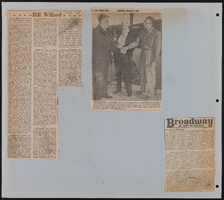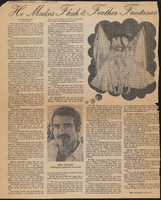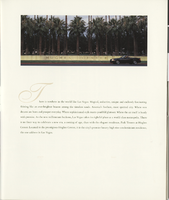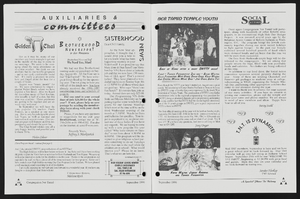Search the Special Collections and Archives Portal
Search Results
Paul May Papers
Identifier
Abstract
The Paul May Papers (1963-1984) contain correspondence, reports and minutes from the Nevada Legislature, campaign materials, and invitations to various events.
Archival Collection
The Mint Hotel Photograph Collection
Identifier
Abstract
The Mint Hotel Photograph Collection consists of photographic prints and postcards from approximately 1960 to 1980. The collection includes photographs of the Mint’s “Behind the Scenes” tour during which guests experienced casino operations, and photographs and postcards of the hotel itself.
Archival Collection
Greg Clemens Photograph Collection
Identifier
Abstract
The Greg Clemens Photograph Collection contains ten black-and-white contact sheets depicting aerial views of Las Vegas, Nevada in 1965. The contact sheets contain approximately eighty-two images showing views of McCarran International Airport, the Las Vegas Convention Center, downtown Las Vegas, and residential neighborhoods.
Archival Collection

Gregory T. H. Lee oral history interview: transcript
Date
Archival Collection
Description
Oral history interview with Gregory T. H. Lee conducted by Stefani Evans, Ayrton Yamaguchi, Cecilia Winchell, and Kristel Marie Peralta on December 1, 2020 for Reflections: The Las Vegas Asian American and Pacific Islander Oral History Project. Gregory discusses his birth in Honolulu, Hawai'i, his upbringing in San Francisco, California, his education from Harvard University, and his moving to Las Vegas in 1988 with his family. He shares how his parents, Doris Shoong Lee and Ted Lee, purchased a casino on East Sahara Avenue and renamed it the Eureka before Gregory left Las Vegas to earn his Juris Doctorate degree from USC Gould School of Law. He talks about his employment history related to law and the joint venture with his parents to open Eureka's sister property in Mesquite, Nevada. Gregory also discusses his Chinese and Japanese heritage, the Hawaiian culture, and his current affairs as well as his take on current events and discrimination in the United States, with particular regard to Black Lives Matter and COVID-19. Subjects discussed include: Kyushu, Japan and "China virus."
Text

Transcript of interview with Ronald "Ron" Lurie by Stefani Evans and Claytee D. White, October 17, 2016 and November 10, 2016
Date
Archival Collection
Description
Ron Lurie is a product of Las Vegas. Ron Lurie knows Las Vegas. The Los Angeles native arrived in Las Vegas with his parents when he was twelve years old; his father opened Market Town next to White Cross Drug Store. Lurie graduated from Las Vegas High School in 1958 and attended Nevada Southern, where he played baseball and basketball before joining the United States Army Reserves. Returning from training, he began working at a new store, Fantastic Fair. Soon the owner, builder Lloyd Whaley, asked him to manage a new Fantastic Fair. At 24 years of age, he managed the entire Fantastic Fair store, which later became Wonder World. Over time, Lurie would manage three of the four Wonder World stores. In this interview, the former mayor of the City of Las Vegas and former Las Vegas City Council member talks about running for City council because he wanted more parks and ball fields downtown and about his political career, which coincided with the years of explosive growth in the 1970s and 1980s. The current vice president and general manager of Arizona Charlie's also v discusses his careers in the grocery business and in gaming; he speaks to giving back to the community and the changing demography of the area surrounding Arizona Charlie's; he talks of the ways Steve Wynn pioneered an aura of glamour that helped to upgrade Downtown Las Vegas; he recalls the challenges of public safety, regional transportation, flood control, and the Monorail and of civic dreams of a magnetic levitation train that would connect Downtown Las Vegas to Cashman Field. He remembers his parents and his wife; he talks about his children, and he shares vignettes of, among many others, Ernie Becker IV, Bill Briare, Al Levy, Steve Miller, and Bob Stupak. Throughout, Mayor Lurie especially beams when he talks about his family, his friends, his work, Las Vegas, the Boys and Girls Clubs, and baseball. This man loves baseball.
Text

Richard W. Bunker Interview, July 18, 2017, July 21, 2017, and September 28. 2017: transcript
Date
Archival Collection
Description
Fourth-generation Nevadan, Las Vegas native, and great grandson of Mormon pioneer Edward Bunker, Richard W. Bunker knows Southern Nevada as few others do. For example, when Richard Bunker speaks of water, he talks about his father's family leaving their home after the completion of Hoover Dam because their little town of St. Thomas was submerged in the rising waters of Lake Mead; he recalls swimming at the Old Ranch pool, the Springs, and the Mermaid pool; he shares stories of hiring Pat Mulroy, mentoring her, and encouraging her to apply to lead the Las Vegas Valley Water District; he mentions the Dunes and its two fresh-water wells, the Sanitation District and wastewater treatment. Few others have actively shaped Southern Nevada as Richard Bunker has through his lengthy career as a lobbyist (1973–2000); assistant manager for City of Las Vegas (1973–77); Clark County Manager (1977–79); member and Chair of the Nevada Gaming Control Board (1980–1982); executive director (1988-1990) and
Text




